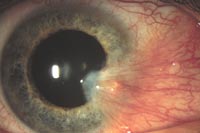July 1st, 2011 by Berci in News
No Comments »

 Did you know that Natalie Portman (under the name, Natalie Hershlag) published a paper in a scientific journal in 2002 while at Harvard?
Did you know that Natalie Portman (under the name, Natalie Hershlag) published a paper in a scientific journal in 2002 while at Harvard?
Frontal lobe activation during object permanence: data from near-infrared spectroscopy.
The ability to create and hold a mental schema of an object is one of the milestones in cognitive development. Developmental scientists have named the behavioral manifestation of this competence object permanence. Convergent evidence indicates that frontal lobe maturation plays a critical role in the display of object permanence, but methodological and ethical constrains have made it difficult to collect neurophysiological evidence from awake, behaving infants. Near-infrared spectroscopy provides a noninvasive assessment of changes in oxy- and deoxyhemoglobin and total hemoglobin concentration within a prescribed region. The evidence described in this report reveals that the emergence of object permanence is related to an increase in hemoglobin concentration in frontal cortex.
*This blog post was originally published at ScienceRoll*
July 1st, 2011 by Dr. Val Jones in Audio, Health Tips
No Comments »

A Pterygium
Dermatologists have done a great job promoting sun safety. We all know that we should use sunscreen or sunblock to avoid burns, and to reapply it religiously when we plan to be outdoors for long periods of time. But how often do we think about protecting our eyes from the same UV rays?
A dear friend of mine has been on a long-term medicine that makes her skin especially sun-sensitive. She did not take sufficient precautions to protect her eyes from UV radiation (though she always wore sunscreen on her skin), and she developed a pterygium that looks just like the photograph above. Her condition reminded me of the importance of eye protection, and I thought I’d offer you 5 excellent reasons to start shielding your eyes from the sun. UV protection is critical for avoiding:
1. Photokeratitis. Photokeratitis is essentially a sunburn of the front layer (cornea) of your eyeball. If you’ve ever had a burning sensation in your eyes after a long day at the beach, or in the snow, you may have burned your eyes. Just as skin sunburns are painful and take a few days to calm down, eye pain can be very uncomfortable. But worse than the temporary discomfort is the increased long-term risks of pterygia, cataracts, and other eye conditions (see below).
2. Pterygia. Pterygia are overgrowths of corneal tissue that can grow across the iris and pupil. They can be cosmetically unsightly, and can block vision if they grow large. They are caused almost exclusively by UV damage, and are most common in people who live near the equator (because their exposure to UV radiation is highest). Surgery is the only known treatment for pterygia, though as many as 50% grow back, and surgical divets in the cornea can cause visual problems.
3. Cataracts. Cataracts are opacities of the eye lenses that lead to partial or total blindness. The exact mechanism by which they occur is unclear, though we know that sun exposure contributes to their development. Cataracts are the number one cause of blindness in the world.
4. Skin Cancers. Basal cell carcinoma (BCC) is a type of skin cancer that primarily develops on skin that has been sunburned, especially in childhood. Melanoma is a deadly form of skin cancer that is much rarer than BCC, but also most commonly develops on skin that has been burned. Squamous cell carcinoma (SCC) is the least invasive type of skin cancer, and usually develops on skin that has had the largest total amount of sun exposure over a lifetime. People who don’t protect the thin eye skin and lids from UV radiation (beginning in childhood) are more likely to develop cancer around the eyes
5. Macular Degeneration. Exposure to the sun’s UV rays can cause damage to the deep structures of the eye, including the retina. Light focused on the macula (the most important part of the retina for vision) can cause damage in the area over time. Macular degeneration results in visual damage and even blindness.
Ok, so I hope I’ve convinced you that UV protection is critically important for your eyes… How can you protect yourself? There are 4 primary strategies:
1. Wear UV protective sunglasses. When buying sunglasses, check out their product labels and avoid glasses that are purely cosmetic – opt for those that block 99-100% of UV A and B rays. Larger glasses and wrap-arounds offer the most coverage. Remember that kids need sunglasses too!
2. Wear a wide-brimmed hat. Although a hat doesn’t always protect you from glare and light reflection from other surfaces, it can reduce the total amount of radiation that reaches your eyes and skin.
3. Wear UV-protective contact lenses. Most people don’t realize that some contact lenses are manufactured with a UV protective layer already built in. Although they are not large enough to protect the entire eye surface (or the skin around the eye) they offer an added layer of protection against harmful UV rays. However, not all contact lenses offer UV protection, and of those that do, not all provide similar absorption levels. An eye care professional can prescribe Class 1 UV-blocking contact lenses, which provide the greatest level of UV protection and which have a Seal of Acceptance for UV Absorbing Contact Lenses from both the American Optometric Association and the World Council of Optometry’s Commissions on Ophthalmic Standards. These lenses block more than 90 percent of UVA rays and 99 percent of UVB rays.
4. Protect your eyes all day. UV radiation for the eyes is actually worse when the sun is lower in the sky. Researchers at the Kanazawa Medical University in Japan found that during early morning and late afternoon, UV exposure to the eyes was about double that of the hours around noon during Spring, Summer and Fall.
For more information about protecting your eyes from the sun, you may enjoy listening to my recent interview with Dr. Stephen Cohen.* He is an optometrist who lives in Arizona – and is therefore well acquainted with UV radiation! Scroll down to the bottom of the page after clicking on the link and you’ll see the podcast.
***
Note that I was paid by Johnson & Johnson Vision Care, Inc. to host the radio show with Dr. Cohen.
July 1st, 2011 by RamonaBatesMD in Health Tips
No Comments »

As the 4th of July approaches, I’ve begun to hear fireworks exploding in my neighborhood. It’s been dry here, so in addition to the risk of injuring a person, there is a risk of setting the fields on fire. I sure hope my neighbors are being responsible.
I hope you will all have a safe and happy July 4th. Be safe and stay out of the ER.
Please use the following tips:
- Never allow children to play with or ignite fireworks. A responsible adult should be in charge.
- Read and follow all warnings and instructions.
- Be sure other people are out-of-range before lighting fireworks. Small children should be kept a safe distance from the fireworks; older children that use fireworks need to be carefully supervised.
- Do not smoke when handling any type of “live” firecracker, rocket, or aerial display.
- Keep all fireworks away from any flammable liquids, dry grassy areas, or open bonfires.
- Keep a bucket of water or working garden hose nearby in case of a malfunction or fire.
- Take note of any sudden wind change that could cause sparks or debris to fall on a car, house, or person. Read more »
*This blog post was originally published at Suture for a Living*
July 1st, 2011 by DrWes in Health Tips, Opinion
No Comments »

He sat in a crisp white coat, staring at a computer screen, note cards in his lap. Occasionally, I noted him jot a note to himself as he compiled his list. A nurse sat next to him, pounding feverishly on the keyboard as she recorded her nurse’s note. He tentatively moved his mouse, then clicked, still staring.
I recall my first day in clinical medicine: no computer, an ER rotation, a white board filled with names and abbreviated medical problems next to them with little magnetic color-coded labels nearby. Room 1: Head trauma. Room 2: Abscess. Room 3: UTI, Room 4: Rash.
I got room 2. It was the biggest, bad-est infected sebaceous cyst on a guy’s back a newly minted doctor had ever seen. Can you say “softball?” “See one, do one,” they told me. And off I went.
Much in medicine has changed since then, but much remains the same. Medicine is miraculous, terrifying, then rewarding all at once. Fortunately, there’s a method within the madness that can serve to preserve and protect those who first start out. Every doctor has had the fortune to learn from those who passed before them as begin their journey to refine their title of “doctor” (literally, “teacher.”)
I thought it would be interesting to put a few of the “Rules of the Road for Medicine” down on paper (with the help of friends on Twitter) for interns and residents as they embark on their own incredible journey ahead. The list is not exhaustive, but hopefully can serve as a resource for our new doctors as they head off to meet their clinical challenges ahead.
Rule #1: Treat every patient like your mother Read more »
*This blog post was originally published at Dr. Wes*
July 1st, 2011 by Peggy Polaneczky, M.D. in Health Policy, Opinion
No Comments »

 The Supreme Court has sided with Big Pharma in their challenge to the Vermont Law limiting the pharmaceutical Industry’s access to physician prescribing information.
The Supreme Court has sided with Big Pharma in their challenge to the Vermont Law limiting the pharmaceutical Industry’s access to physician prescribing information.
The nation’s high court handed down a verdict Thursday in the Sorrell v. IMS Health case, striking down by a 6-3 vote a 2007 Vermont law that that bans the practice of data mining — the sale and use of prescriber-identifiable information for marketing or promoting a drug, including drug detailing — unless a physician specifically gives his or her permission to use the information.
Apparently, Big Pharma’s right to “free speech” trumps my right to privacy. How getting access to my prescribing information has anything to do with free speech is beyond me. In the twisted logic of the pro-business, anti-citizen Supreme Court –
Speech in aid of pharmaceutical marketing… is a form of expression protected by the Free Speech Clause of the First Amendment. Read more »
*This blog post was originally published at The Blog That Ate Manhattan*
 Did you know that Natalie Portman (under the name, Natalie Hershlag) published a paper in a scientific journal in 2002 while at Harvard?
Did you know that Natalie Portman (under the name, Natalie Hershlag) published a paper in a scientific journal in 2002 while at Harvard?















